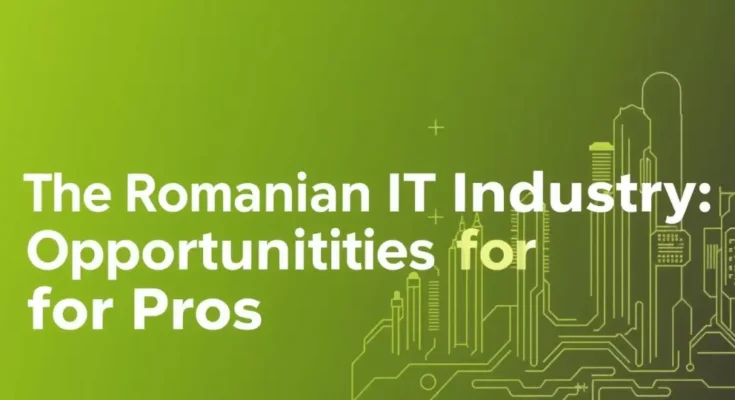The Romanian IT Industry: Opportunities for Pros
Romania’s tech sector is booming, offering exciting prospects for IT professionals worldwide. As an emerging Eastern European tech hub, the country has quickly become a hotspot for software development talent. The Romanian IT industry has seen remarkable growth, attracting global companies and nurturing local startups alike.
With a rich pool of skilled developers and a favorable business climate, Romania is positioning itself as a key player in the European tech scene. The blend of technical expertise, competitive costs, and a strategic location makes it an attractive destination for tech companies and professionals seeking new opportunities.
As we delve deeper into Romania’s tech ecosystem, we’ll explore the factors driving its success and the unique advantages it offers to IT professionals. From bustling tech hubs to innovative startups, Romania’s IT landscape is diverse and full of potential for career growth and exciting projects.
Key Takeaways
- Romania is a rapidly growing Eastern European tech hub
- The country offers numerous opportunities for IT professionals
- Software development is a key strength of the Romanian tech sector
- Global companies are increasingly investing in Romania’s IT industry
- The blend of skill, cost-effectiveness, and location makes Romania attractive
- Romania’s tech ecosystem supports both established firms and startups
Overview of Romania’s Tech Ecosystem
Romania’s tech ecosystem has seen rapid growth, turning the country into a key European IT hub. This transformation is rooted in a deep tech history and strategic investments in education and infrastructure.
Historical Development of IT Sector
The IT sector in Romania began in the 1960s with the production of its first computers. Despite communist era challenges, this early start set the stage for growth. Post-1989, the sector flourished, with foreign companies tapping into Romanian talent.
Current Market Size and Growth Trends
The IT market in Romania has shown impressive growth. In 2020, it contributed over 6% to the GDP, with forecasts for further growth. The sector now employs over 200,000 professionals, a figure that’s rising each year.
| Year | IT Sector Contribution to GDP | Number of IT Professionals |
|---|---|---|
| 2018 | 5.2% | 150,000 |
| 2019 | 5.7% | 175,000 |
| 2020 | 6.1% | 200,000 |
Key Tech Hubs and Clusters
The Bucharest tech scene is at the forefront, with a plethora of startups and multinational companies. Cluj-Napoca, known as Romania’s Silicon Valley, boasts a thriving ecosystem of tech firms and educational institutions. Timisoara, Iasi, and Brasov are also emerging as tech hubs, enhancing Romania’s tech reputation.
“Romania’s IT sector has become a cornerstone of our economy, driving innovation and attracting global attention,” says Maria Popescu, President of the Romanian IT Association.
The Romanian IT Industry: Opportunities for Pros
Romania’s tech scene is booming with IT career opportunities. From established companies to innovative tech startups, the country offers a diverse range of Romanian tech jobs for skilled professionals. Software engineering positions are particularly abundant, attracting talent from across Europe and beyond.
- Web development
- Mobile app creation
- Data science
- Artificial intelligence
- Cybersecurity
Multinational corporations have set up shop in Romania, recognizing the country’s skilled workforce and cost-effective development rates. These global players offer attractive packages and career growth prospects for IT professionals.
Tech startups are flourishing in cities like Bucharest, Cluj-Napoca, and Iași. These dynamic environments provide exciting opportunities for those seeking to make an impact in cutting-edge technologies.
“Romania’s IT sector is a hidden gem in Europe, offering world-class talent and innovative solutions.”
With a strong emphasis on technical education and a multilingual workforce, Romania continues to solidify its position as a prime destination for IT professionals seeking rewarding careers in a rapidly evolving industry.
Competitive Advantages of Romanian Tech Talent
Romania’s tech industry is a magnet for global companies, thanks to its competitive advantages. The country’s talent pool, bolstered by top-notch tech education, offers a unique blend of skills and value.
Technical Education System
Romanian universities are renowned for producing exceptional IT professionals. The curriculum is designed to focus on practical skills, ensuring graduates are ready for real-world challenges. This emphasis on quality education leads to a steady supply of skilled developers, equipped to handle complex projects.
Multilingual Workforce
Romania’s tech scene is distinguished by its multilingual developers. Many professionals are fluent in English, German, or French, making communication with international clients seamless. This linguistic versatility significantly improves collaboration and project outcomes.
Cost-Effective Development Rates
Romania offers competitive IT salaries, attracting businesses with its cost-effectiveness. While developers are fairly compensated, their rates are lower than those in Western Europe. This balance of quality and affordability positions Romania as a prime destination for tech outsourcing.
| Advantage | Impact |
|---|---|
| Strong tech education | Skilled, job-ready graduates |
| Multilingual skills | Improved global collaboration |
| Competitive rates | Cost savings for businesses |
These elements combine to make Romanian tech talent an attractive option for companies. They seek high-quality, cost-effective solutions in the global IT market.
Top Tech Companies Operating in Romania
Romania’s tech scene has grown significantly, drawing in both multinational corporations and local talent. The country is now a key player in software outsourcing. This is thanks to both Romanian IT firms and global tech giants establishing operations here.
Oracle is a standout in Romania, with a major presence in Bucharest. The company has made significant investments in Romania, creating thousands of jobs. This has greatly contributed to the local tech industry.
Romanian IT firms like UiPath have gained international recognition. Founded in Bucharest, UiPath has become a unicorn startup, valued in the billions. Its success story motivates local entrepreneurs and highlights Romania’s tech potential.
Other notable tech giants in Romania include:
- Microsoft: With a significant R&D center in Bucharest
- Amazon: Operating a development center focused on Alexa
- IBM: Maintaining a delivery center for cloud and cognitive solutions
- Adobe: Running a development center in Bucharest
These companies offer employment and drive innovation and knowledge sharing. Their presence has boosted Romania’s global tech reputation. This makes it a prime location for IT professionals and software outsourcing projects.
In-Demand Skills and Technologies
Romania’s IT industry is hungry for professionals with expertise in the latest technologies. It needs individuals who can keep up with the fast-paced tech world.
Programming Languages
In Romania’s tech sector, certain programming languages are key to success. Java, Python, and JavaScript are at the forefront of sought-after skills. C++ and C# are also highly valued, particularly for game development and enterprise software.
Framework Expertise
Knowing software frameworks is crucial for Romanian developers. React, Angular, and Vue.js are highly sought after for front-end development. Meanwhile, Spring, Django, and Laravel are in demand for back-end roles.
Emerging Technology Requirements
The Romanian tech scene is diving into new, innovative areas. Skills in AI and machine learning, especially with TensorFlow and PyTorch, are becoming more valuable. Blockchain technology is also on the rise, offering opportunities for developers familiar with Solidity and Hyperledger.
- Data Science: R, Python, and SQL
- Cloud Computing: AWS, Azure, and Google Cloud
- DevOps: Docker, Kubernetes, and Jenkins
As Romania’s IT sector continues to grow, professionals who excel in both technical skills and adaptability will thrive. Keeping up with these in-demand skills can lead to exciting projects and career advancement in this vibrant market.
Salary Expectations and Benefits
Romanian IT salaries have seen steady growth in recent years. Software engineer earnings in Romania are competitive within the Eastern European market. Entry-level developers can expect around $20,000 annually, while senior roles often reach $50,000 or more.
Tech compensation packages in Romania go beyond base pay. Many companies offer stock options, performance bonuses, and professional development budgets. These perks make Romanian IT jobs attractive to both local and international talent.
- Private health insurance
- Flexible work hours
- Remote work options
- Gym memberships
- Meal vouchers
While salaries may be lower than in Western Europe or the US, the cost of living in Romania is significantly lower. This allows IT professionals to enjoy a high quality of life.
| Position | Junior (1-3 years) | Mid-level (3-5 years) | Senior (5+ years) |
|---|---|---|---|
| Software Developer | $20,000 – $30,000 | $30,000 – $45,000 | $45,000 – $60,000+ |
| Data Scientist | $25,000 – $35,000 | $35,000 – $50,000 | $50,000 – $70,000+ |
| DevOps Engineer | $22,000 – $32,000 | $32,000 – $48,000 | $48,000 – $65,000+ |
Working Culture and Professional Environment
The Romanian work culture in tech companies is a blend of traditional values and modern practices. This unique mix creates a dynamic professional environment. It attracts talent from all over the world.
Work-Life Balance
Romanian tech firms focus on work-life balance. They offer flexible hours and generous vacation policies. Employees work a standard 40-hour week, with overtime pay available.
This approach boosts job satisfaction and productivity. It shows the company values its employees’ well-being.
Remote Work Opportunities
Remote work policies are becoming more popular in Romania’s IT sector. Companies adopt hybrid models, allowing staff to work from home or the office. This flexibility attracts international talent and improves employee retention.
Corporate Culture
Tech company perks in Romania extend beyond the basics. Firms provide comprehensive health insurance, gym memberships, and team-building events. Some even offer on-site childcare and cafeterias with free meals.
These benefits create a positive work environment. They foster employee loyalty and satisfaction.
| Aspect | Description |
|---|---|
| Work Hours | 40-hour workweek, flexible scheduling |
| Remote Work | Hybrid models common, full remote options available |
| Benefits | Health insurance, gym memberships, team events |
| Professional Development | Training programs, conference attendance, skill workshops |
Professional development is a key focus in Romanian tech firms. They invest in training programs and sponsor conference attendance. They also organize skill-building workshops.
This commitment to growth keeps Romanian IT professionals at the forefront of industry trends.
Legal Framework and Employment Regulations
Working in Romania’s IT industry demands a grasp of the legal landscape. This section delves into key aspects for professionals eyeing the Romanian tech scene.
Visa Requirements
Romanian work visas are crucial for non-EU professionals. The process requires a job offer and employer sponsorship. EU citizens face simpler procedures, needing only to register their residence upon arrival.
Contract Types
IT employment contracts in Romania vary. Full-time permanent contracts are prevalent, offering stability and benefits. Freelance and project-based agreements provide flexibility, but each has legal implications. It’s vital to understand the terms before signing.
Tax Considerations
Expatriate taxes are a significant concern in Romania. The country offers tax incentives for IT professionals, including income tax exemptions for certain roles. Local employees and expatriates face different tax rates. Professional advice ensures legal compliance and financial planning.
- Income tax rates vary based on employment status
- Social security contributions are mandatory
- Double taxation agreements exist with many countries
Grasping these legal aspects is key to a smooth transition into Romania’s booming IT sector. Consulting with legal experts is advisable to navigate work permits, contracts, and tax obligations effectively.
Career Growth and Development Paths
Romania’s IT industry is booming, offering numerous paths for career advancement. From junior developers to senior roles, team leads, and project managers, the opportunities are vast. Companies invest heavily in professional development, ensuring employees stay updated with the latest trends.
As the industry grows, so do leadership roles. Tech professionals can aim for positions like CTO, IT Director, or VP of Engineering. These roles demand a mix of technical know-how and management acumen.
For those with entrepreneurial ambitions, tech entrepreneurship in Romania is flourishing. Startups are sprouting up in areas like fintech and AI. Support systems like incubators and accelerators offer resources and guidance to new businesses.
| Career Path | Skills Required | Typical Timeline |
|---|---|---|
| Developer to Team Lead | Coding, Project Management | 3-5 years |
| Team Lead to CTO | Leadership, Strategic Planning | 5-10 years |
| Tech Entrepreneur | Innovation, Business Acumen | Varies |
Whether your goal is a leadership role or starting your own business, Romania’s tech landscape is rich with opportunities for growth and innovation.
Networking and Professional Communities
Romania’s tech scene is rich with networking chances for IT pros. From tech events to industry groups, there’s a wealth of ways to meet peers and grow your skills.
Tech Events and Conferences
IT conferences in Romania draw tech giants and local innovators. Techsylvania in Cluj-Napoca is a highlight, showcasing the latest tech and offering developer workshops. Bucharest Tech Week is a celebration of innovation, bringing together tech fans for a week.
Industry Associations
Professional associations are key in Romania’s IT world. The Association of the Software and Services Industry in Romania (ANIS) fights for the sector’s interests and growth. These groups host networking events, training, and share industry insights.
Online Communities
Virtual spaces connect Romanian tech pros worldwide. LinkedIn groups like “IT Jobs in Romania” and “Romanian Software Community” are hubs for discussion and job leads. Facebook groups for developers share knowledge and plan local meetups.
| Community Type | Examples | Benefits |
|---|---|---|
| Tech Events | Techsylvania, Bucharest Tech Week | Exposure to latest trends, networking with industry leaders |
| Professional Associations | ANIS | Industry advocacy, training programs, networking events |
| Online Platforms | LinkedIn groups, Facebook developer meetups | Job opportunities, knowledge sharing, local connections |
Getting involved in these communities can greatly enhance your career in Romania’s booming tech sector. Whether you’re at IT conferences or online forums, each connection leads to new chances and insights.
Conclusion
Romania’s IT industry is rapidly advancing, with the tech sector experiencing significant growth. More global companies are establishing their presence in the country. This trend opens up promising career opportunities for both local and international talent.
The future of Romania’s IT industry appears promising. Its skilled workforce, competitive costs, and burgeoning tech hubs make it an attractive location for tech projects. IT professionals in Romania are excelling in areas such as software development, AI, and cybersecurity.
As Romania’s global tech competitiveness increases, so do the prospects for career advancement. IT professionals can look forward to competitive salaries, a good work-life balance, and the chance to work on innovative projects. With a blend of technical expertise and creativity, Romania is poised to leave a significant impact on the global tech scene.



